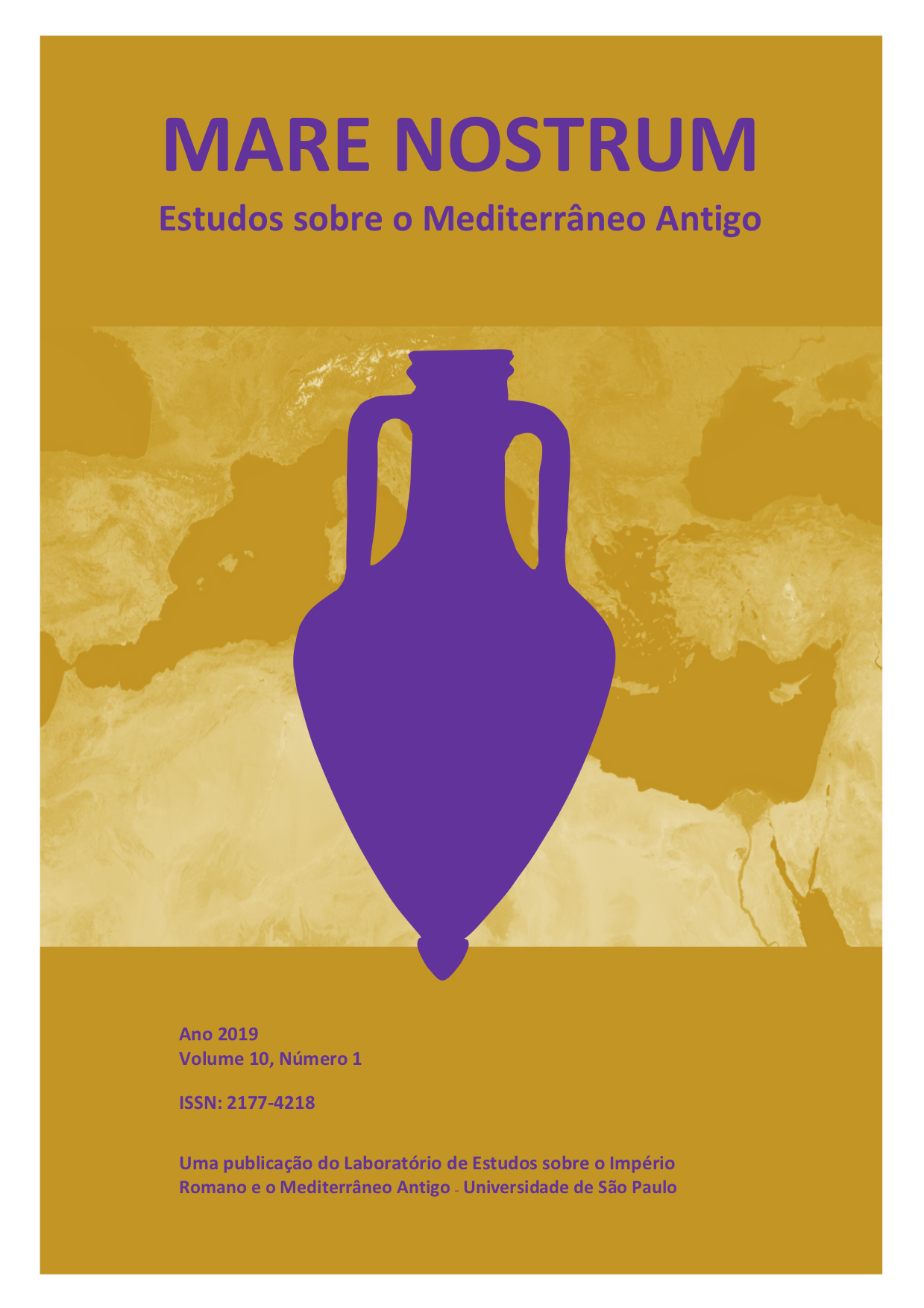Justice for Animals According to Plutarch
DOI:
https://doi.org/10.11606/issn.2177-4218.v10i1p54-76Palavras-chave:
Vegetarianism in antiquity; Animal justice; Human-animal relations; PlutarchResumo
This paper is an attempt to describe in details Plutarch’s view on the idea of justice between animals and humans, on the basis of a representative selection of passages from his works. Most of the analyzed passages are from De sollertia animalium and De esu carnium. The criterion of selection was lexical and contextual, so passages containing words semantically related to the Greek terms for justice or law were particularly taken into account, as well as assages simply referring to the subject of justice for animals from the context. The conclusion is that Plutarch believed that justice between humans and animals is possible and should be applied, but being conscious of how difficult this postulate is to achieve, he was content with urging to limit the consumption of meat.
Downloads
Referências
Primary Sources
Aratus. Phaenomena. Callimachus. Hymns and Epigrams. Lycophron. Aratus. Translation by A.W. Mair & G.R. Mair, 1921. Available online: <http://www.theoi.com/Text/AratusPhaenomena.html>. Acess: 11 fev. 2019.
Aristotle. Ethica Nicomachea. Edited by J. Bywater. Oxford: Clarendon Press, 1894. l
Aristotle Politica. Edited by W.D. Ross. Oxford: Clarendon Press, 1957.
Chrysippus. De Anima Hominis. Stoicorum Veterum Fragmenta. Collegit Ioannes ab Arnim. Stutgardiae in Aedibus B. G. Teubneri, 1964, vol. 2.
Diogenes Laertios. Lives of Eminent Philosophers. Edited by R.D. Hicks. Cambridge: Harvard University Press, 1972.
Empedocles. Katharmoi. Die Fragmente der Vorsokratiker. Griechisch und Deutsch von Hermann Diels. Berlin: Weidmannsche Buchhandlung, 1906.
Euripides. Alcestis. Cyclops. Alcestis. Medea. Edited and translated by David Kovacs. Cambridge, MA/London: Harvard University Press, 2001.
Euripides. Alcestis. Hippolytus. Children of Heracles. Hippolytus. Andromache. Hecuba.
Edited and translated by David Kovacs. Cambridge, MA/London: Harvard University Press, 1995.
Herodotus. Histories. Translation by A.D. Godley. Cambridge, MA/London: Harvard University Press/William Heinemann, 1960, vol. 1.
Hesiod. Works and Days. The Homeric Hymns and Homerica. Translation by Hugh G. Evelyn-White. Cambridge, MA/London: Harvard University Press/William Heinemann, 1959.
Plato. Leges. Platonis Opera. Recognovit Brevique Adnotatione Critica Instruxit Ioannes Burnet. Oxford: Oxford Classical Texts, 1907, vol. 5.
Plutarch. Marcus Cato. In: Lives. Translation by Bernadotte Perrin. Cambridge, MA/London: Harvard University Press/William Heinemann, 1912, vol. 2.
Plutarch. Marcus Cato. Moralia. Translation by Frank Cole Babbitt. Cambridge, MA/London: Harvard University Press/William Heinemann, 1928, vol. 2.
Plutarch. Marcus Cato. Moralia. Translation by W.C. Helmbold. Cambridge, MA/London: Harvard University Press/William Heinemann, 1939, vol. 6.
Plutarch. Marcus Cato. Moralia. Translation by Harold Cherniss & W.C. Helmbold. Cambridge, MA/London: Harvard University Press/William Heinemann, 1957, vol. 12.
Plutarch. Marcus Cato. Plutarchi Chaeronensis Moralia. Recognovit Gregorius N. Bernardakis. Lipsiae, 1891, vol. III.
Plutarch. Marcus Cato. Plutarchi Chaeronensis Moralia. Recognovit Gregorius N. Bernardakis. Lipsiae, 1892, vol. IV.
Plutarch. Marcus Cato. Plutarchi Chaeronensis Moralia. Recognovit Gregorius N. Bernardakis. Lipsiae, 1895, vol. VI.
Porphyry. On Abstinence from Killing Animals. Translated by Gillian Clark. London/New York: Bloomsbury Academic, 2014
Secondary Sources
Balaudé, Jean-François. Parenté du vivant et végétarisme radical: Le «défi» d’Empédocle. In: Cassin, Barbara; Labarrière, Jean-Louis; Romeyer-Dherbey, Gilbert (eds) L’animal Dans l’Antiquité. Paris: Librairie Philosophique J. Vrin, 1997, p. 31-54.
Becchi, Francesco. Istinto e intelligenza negli scritti zoopsicologici di Plutarco. In: Bandini, Michele; Pericoli, Federico G. (eds) Scritti in Memoria di Dino Pieraccioni. Florence: Istituto Papirologico G. Vitelli, 1993, p. 59-83.
Becchi, Francesco. Irrazionalità e razionalità degli animali. Prometheus, vol. 26, 2000, p. 205-225.
Brink, Charles Oscar. Οἰκείωσις and Οἰκειότης: Theophrastus and Zeno on nature in moral theory. Phronesis, vol. 1, n. 2, 1956, p. 123-145.
Cornelli, Gabriele. In Search of Pythagoreanism: Pythagoreanism as an Historiographical Category. Berlin/Boston: De Gruyter, 2013.
Cornelli, Gabriele; McKirahan, Richard; Macris, Constantinos (eds) On Pythagoreanism. Berlin/Boston: De Gruyter, 2013.
Dierauer, Urs. Tier und Mensch im Denken der Antike: Studien zur Tierpsychologie, Anthropologie und Ethik. Amsterdam: B.R. Grüner, 1977.
Edwards, G. Fay. Irrational animals in Porphyry’s logical works. A problem for the consus interpretation of On Abstinence. Phronesis, vol. 59, 2014, p. 22-43.
Edwards, G. Fay. The purpose of Porphyry’s rational animals. A dialectical attack on the Stoics in On Abstinence From Animal Food. In: Sorabji, Richard (ed.) Aristotle Re-Intepreted. New Findings On Seven Hundred Years Of The Ancient Commentators. London: Bloomsbury Academic, 2016, p. 263-290.
Guthrie, William Keith Chambers. A History of Greek Philosophy. Vol. 1, The Earlier Presocratics and the Pythagoreans. Cambridge: Cambridge University Press, 1962.
Haussleiter, Johannes. Der Vegetarismus in der Antike. Berlin: Verlag von Alfred Töpelmann, 1935.
Hubert Jr, Martin. Plutarch’s De Sollertia Animalium 959 B-C: The discussion of the encomium of hunting. American Journal of Philology, vol. 100, n. 1, 1979, p. 99-106.
Krauss, Fritz. Die rhetorischen Schriften Plutarchs und ihre Stellung im Plutarchischen Schriftenkorpus. Nürnberg: Druck von J. L. Stich, 1912.
Lecky, William Edward Hartpole. History of European Morals: From Augustus to Charlemagne, Vol. 1. London: Longmans, Green, and Co., 1890.
Miszczyński, Damian. Wegetarianizm orfików i pitagorejczyków oraz jego możliwe przyczyny na podstawie wybranych źródeł literackich. MA Thesis in Classical Philology. Kraków: Institute of Classical Philology, Jagiellonian University, 2015.
Newmyer, Stephen T. Plutarch on justice toward animals: Ancient insights on a modern debate. Scholia: Studies in Classical Antiquity, vol. 1, n. 1, 1992, p. 38-54.
Newmyer, Stephen T. Just beasts? Plutarch and modern science on the sense of fair play in animals. The Classical Outlook, vol. 74, n. 3, 1997, p. 85-88.
Newmyer, Stephen T. Animals, Rights and Reason in Plutarch and Modern Ethics, London/New York: Routledge, 2006.
Newmyer, Stephen T. Animals in Greek and Roman Thought: A Sourcebook, London/New York: Routledge, 2011.
Rawls, John. A Theory of Justice. Cambridge, MA: The Belknap Press of Harvard University Press, 1999.
Roskam, Geert. Plutarch against Epicurus on affection for offspring: A reading of De amore prolis. In: Geert, Roskam; van der Stockt, Luc (eds) Virtues For The People: Aspects Of Plutarchan Ethics. Leuven: Leuven University Press, 2011, p. 175-202.
Sorabji, Richard. Animal Minds & Human Morals: The Origins of the Western Debate, 1st Edition 1993. London: Duckworth, 1995.
Steiner, Gary. Plutarch on the question of justice for animals. Ploutarchos, n.s., vol. 7, 2010, p. 73-82.
Tsekourakis, Damianos. Pythagoreanism or Platonism and ancient medicine? The reasons for vegetarianism in Plutarch’s ‘Moralia’. In: Haase, Wolfgang (ed.) Aufstieg und Niedergang der römischen Welt II.36.1. Berlin/New York: De Gruyter, 1987, p. 366-393.
West, Martin L. The East Face of Helicon: West Asiatic Elements in Greek Poetry and Myth, Oxford: Oxford University Press, 1997.
Ziegler, Konrat. Plutarchos von Chaironeia. Stuttgart: Alfred Druckenmüller Verlag, 1964.
Downloads
Publicado
Edição
Seção
Licença
Os conteúdos expressos nos textos publicados pela Mare Nostrum são de exclusiva responsabilidade de seus respectivos autores.
A reprodução dos textos editados pela Mare Nostrum é permitida sob licença Creative Commons, Atribuição-NãoComercial (CC BY-NC).
Autores que publicam nesta revista concordam com os seguintes termos:
- Autores mantém os direitos autorais e concedem à revista o direito de primeira publicação, com o trabalho simultaneamente licenciado sob a Licença Creative Commons Attribution que permite o compartilhamento do trabalho com reconhecimento da autoria e publicação inicial nesta revista.
- Autores têm autorização para assumir contratos adicionais separadamente, para distribuição não-exclusiva da versão do trabalho publicada nesta revista (ex.: publicar em repositório institucional ou como capítulo de livro), com reconhecimento de autoria e publicação inicial nesta revista.
- Autores têm permissão e são estimulados a publicar e distribuir seu trabalho online (ex.: em repositórios institucionais ou na sua página pessoal) a qualquer ponto antes ou durante o processo editorial, já que isso pode gerar alterações produtivas, bem como aumentar o impacto e a citação do trabalho publicado (Veja O Efeito do Acesso Livre).









